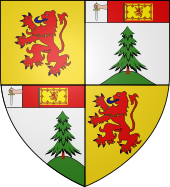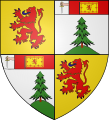Clan Farquharson
|
||||||||||||
|
||||||||||||
|
||||||||||||
Farquharson is the name of a Scottish clan that originated in Aberdeenshire . The name comes from a 15th century forester named Farquhar.
history
The 4th Chief, Donald, was able to win Invercauld Castle by marriage as the headquarters of the clan, which is now inhabited by Captain Alwyne Farquharson, 16th Laird of Invercauld. He has his Moor hunting (with the known grouse leased) to the royal family in the summer holidays the adjacent Balmoral Castle inhabited whose land also originally belonged to the Farquharson; Birkhall , now the summer residence of Charles, Prince of Wales , was also built by the Farquharsons in the 18th century.
The 5th Chief, Finlay Mor, fell as standard bearer of the Scottish Army in 1547 at the Battle of Pinkie Cleugh , in which he had supported the King. The clan remained loyal to the Stuarts and also fought for their cause under Montrose and Bonnie Dundee and during the First Jacobite Rising in 1715 at Preston . After this revolt was put down, Braemar Castle , which was originally built as a bulwark against the clan, was confiscated by the crown and given as a reward to the Farquharson clan, who rebuilt the castle from 1748 and still owns it today.
During the Second Jacobite Rising in 1745, the chief refused to support the Stuarts, which resulted in his wife leading the Farquharsons.
The clan's motto is Fide et fortitudine (“Through loyalty and strength”).
photos
literature
- Alan Bold: Scottish tartans. Pitkin Pictorials, London 1978, ISBN 0-85372-245-5 , ( Pitkin "Pride of Britain" Books ).
Web links
- Company website Farquharson Clan UK (English)
- The website Clan Farquharson Association of Canada (English)
- Website of the company Clan Farquharson, USA (English)
Individual evidence
- ↑ clanchiefs.org ( Memento of the original from July 26, 2011 in the Internet Archive ) Info: The archive link was automatically inserted and not yet checked. Please check the original and archive link according to the instructions and then remove this notice.
- ↑ James Logan's The Clans of the Scottish Highlands, 1845







